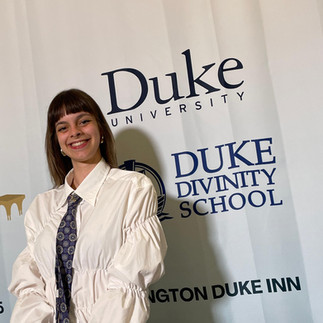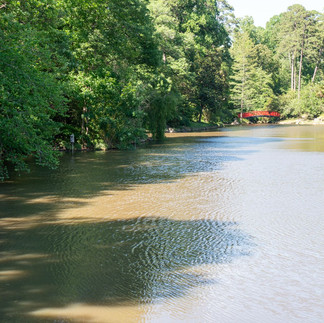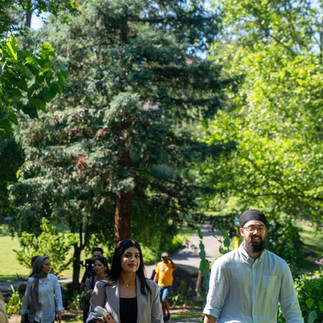5 Things I Learned from 10 Days in North Carolina
- OPA UK

- Sep 3, 2025
- 7 min read
Getting off the plane from London, I shed my jumper as I stepped into the North Carolina sun. Giddy with excitement, I caught up with the three other young people who had come from the UK. We teased each other about having to get into different passport control lines and who would have to order the Uber to our hotel.
It was May, and I had just been accepted to attend the Youth Interfaith Leaders Fellowship on climate change at Duke University. The programme, hosted by Duke Divinity School in partnership with Faith for Our Planet, brought together 18 young people of faith from across the globe. Over the course of ten days, we explored the intersections of religion, climate justice, moral imagination, and community resilience.
I could never have guessed that a random email back in November inviting me to apply would lead me here: not only to this fellowship, but to a series of lasting friendships.
Distilling five lessons from such a rich experience has been difficult for me and others, but here are the ones that have stayed with me most vividly:
1. Climate Change is a Moral and Spiritual Crisis

For our introduction to the fellowship, we were sitting in a high-ceilinged, dome-shaped hall, with giant windows overlooking the biggest magnolia tree I’ve ever seen. You know what they say: everything’s bigger in America… We talked about the importance of this fellowship and its key aims. The fellowship encouraged us not just to consider the environmental crises we are facing but also how we are going to contribute to their solutions, to think both about the knowledge we are gaining and the relationships we are building.
Throughout, we highlighted practices like moderation, gratitude, humility, and the fact that they are shared across faith traditions. This commonality can help unite people across faiths. And yet are so difficult to live by sometimes. When we interrogated why applying these seemingly simple spiritual capacities posed such a great challenge, we came to this conclusion: that a common and pervasive narrative tells us that human success and worth are deeply dependent upon our ability to own as much of the Earth as possible.
And this doesn't just affect nature; it affects how we see each other and ourselves. Our environmental crises stem from disordered relationships: with the earth, with each other, and with the divine. This distortion is rooted in a materialism so deep it shapes not only our economies and policies, but our very minds and behaviours.
At that moment the connection between faith and climate stopped being abstract for me. Climate change is not simply a scientific or technological problem. At its heart, it’s a spiritual and moral issue. And as such, it has to be solved through science and technology, common spiritual practice, global policies, healthy relationships and uplifting narratives.
The Bahá’í teachings, and most faith traditions, offer one such narrative: that humanity is as one family and the earth our shared habitation. The disparity between this vision and reality as it is now leads people to feel frustrated and despondent about the world.
As I reflected on this idea, my eyes would wander over to the magnolia tree and its giant, prehistoric-looking flowers and I thought, What kind of world might we build if ‘worth’ were no longer linked to possession?
2. Coherence between Means and Ends
Throughout the week, walking in the glorious woods behind the university every chance I got, I was struck by how much emphasis was placed not only on what we did, but on how we did it. From treasure hunts to storytelling workshops to deep theological dialogues, I was reminded that our means must be compatible with our ends for both to be sustainable.
We all want to live in a peaceful, cohesive and green society. Like a glittering oasis in the distance, it becomes clearer the closer we get to it. The path we tread is not one walked by a chosen few but traversed by scores upon scores. It accommodates many paces and strides and is made richer for it. This diversity is integral in nature and without it, none of us would be here.
One evening, we were invited to a panel on which one of the fellows was chosen to speak. Everyone rallied around her and my heart swelled. Each fellow supported in any way they could and when she got up on that stage, the sound of our thundering applause and whoops were deafening. While she spoke eloquently, all of us looked at each other, chests puffed out like proud mama birds.
Without hesitation, we all united behind our friend and felt her success as all of ours. After that, we became a community, encouraging each other at every step. It showed me the importance of our approach to the climate crisis. That through creating communities of joy and support, once insurmountable obstacles feel smaller and the lofty goals of a green transition more achievable.
3. Science, Religion, and Policy Need Each Other

One of our last sessions covered a UN style simulation of a climate crisis case study. It reminded me of the importance of bridging domains that are too often siloed and pitted against one another.
Each of us were given an agency or stakeholder to represent in the simulation. And it was ridiculous and a bit chilling to see that after all these days of building connections and becoming friends, how quickly things fell apart when our interests clashed. Within minutes of ‘negotiating’ civil society was yelling at the government, NGOs were rocking back and forth in the corner and the media was lapping it all up. These were the roles we were given to play and it worked perfectly.
It illustrated the deeper point that unless people feel like they’re all in this together, and we all internalise how interconnected we are, it becomes so easy for these more destructive narratives to take hold.
Whether in public health, diplomacy, or theology, I saw how urgent it is to develop a shared language that connects scientific urgency with moral clarity and effective policy. Each of these sectors of human progress, though distinct, need to work coherently within one common framework.
As one passage from the Baha’i writings states, “Religion is religion as science is science. The one defines goals that serve the evolutionary process; the other assists in their attainment. Together, they constitute the dual knowledge system impelling the advance of civilization.”
Throughout the simulation, whenever I could let my feelings ebb enough to actually think, I kept wondering: what breakthroughs might be possible if these fields stopped working in parallel or in opposition and instead braided their knowledge together?
4. A Common Solution Requires a Common Cause
The climate movement can sometimes feel exclusive, full of jargon, posturing, or expectations about who belongs and who doesn’t. During the fellowship, some people shared that they have felt like they “don’t look or sound the part,” or that they lack the right expertise to even be allowed to care about climate issues.
But we know that the world will not get better through the efforts of a few. And we know that a few people constructing and deploying solutions for others and to others isn’t sustainable. When channelled through a common framework for action, our diversity is our greatest strength. We have conviction that no matter who someone is; young, older, woman, man or child, we have something to contribute for a greener world.
Our conversations reminded me that the invitation to act on climate must be universal. We reflected in particular on the role of indigenous women of faith, who often hold invisible
but decisive leadership in their homes and communities. With trust as a key ingredient, communities can achieve great progress.
A particularly striking story shared during this trip was from a friend working in the grassroots in Ghana. They shared that their sea-side community would go crab-fishing every day. Apart from Tuesday. In fact, they didn’t pick fruit or vegetables on Tuesdays, didn't farm or slaughter animals. They took a complete break from any extractive practices. No one ever knew why this day was chosen or understood the need for a break at all. But they continued to carry forward this ancient practice, out of love and trust. It was only in the last few decades the community realised that the practice of allowing nature to rest one day a week and not extracting anything from the natural world was key to its sustainability. Science had come together with traditional knowledge, connecting evidence with cultural practice.
Sustainable practices often grow from trust and collective memory and that by bridging tradition and science, we can unlock powerful solutions. And by not just allowing everyone to join in but championing the participation of all, our solutions will be more durable, flexible and creative.
5. From Eco-Anxiety to Shared Resilience

One of the most moving sessions was on building resilience in the face of eco-anxiety. We were in a church that had been remodelled into the faith building, lots of chairs in a row facing a lectern, under a triangular thatched roof. Watching small house sparrows diving past the window, I felt a collective realisation setting over all of us. That heavy emotions that come with living in an age of transition doesn’t have to be accompanied by grief and despair.
Community is a vital protagonist of society. It directs the energies of individuals for collective betterment. In that session, it became clear that resilience is about transmuting fear and sorrow into usable energy, like straw into gold. Through strong and vibrant communities we can be “affected by these travails” but not “confused by them,” “saddened by humanity’s sufferings, but not paralysed.”
Resilience is the capacity to continually rise, together, in service. That collective spirit can turn anxiety into courage.
Moving Forward

This is only the beginning. At the end of the fellowship, we were asked to write time-capsule letters to ourselves to be opened in a year's time. While I was writing my letter, a great bubble of energy began to grow within me. I was so excited to come back to the UK and hit the ground running. Looking forward to what we could do together I couldn’t contain myself.
In the months since, those hopes and that excitement have blossomed, through the LSE Climate Forum and London Climate Action Week, where I spoke alongside other fellows. The International Environment Forum hosted its annual conference in the UK and a few of us attended and contributed to it.
What gives me hope is not only the ideas we shared, but the people who carry them forward, whether in Ghana, Nepal, or Norway. The way these now friends carry themselves in the world makes me look forward to what they do next and fills me with excitement for the future.
The seeds planted in North Carolina are already sprouting and I can’t wait to see how they will have grown by the time I open that letter a year from now.
Written by Maria Pavlou Marshall





























